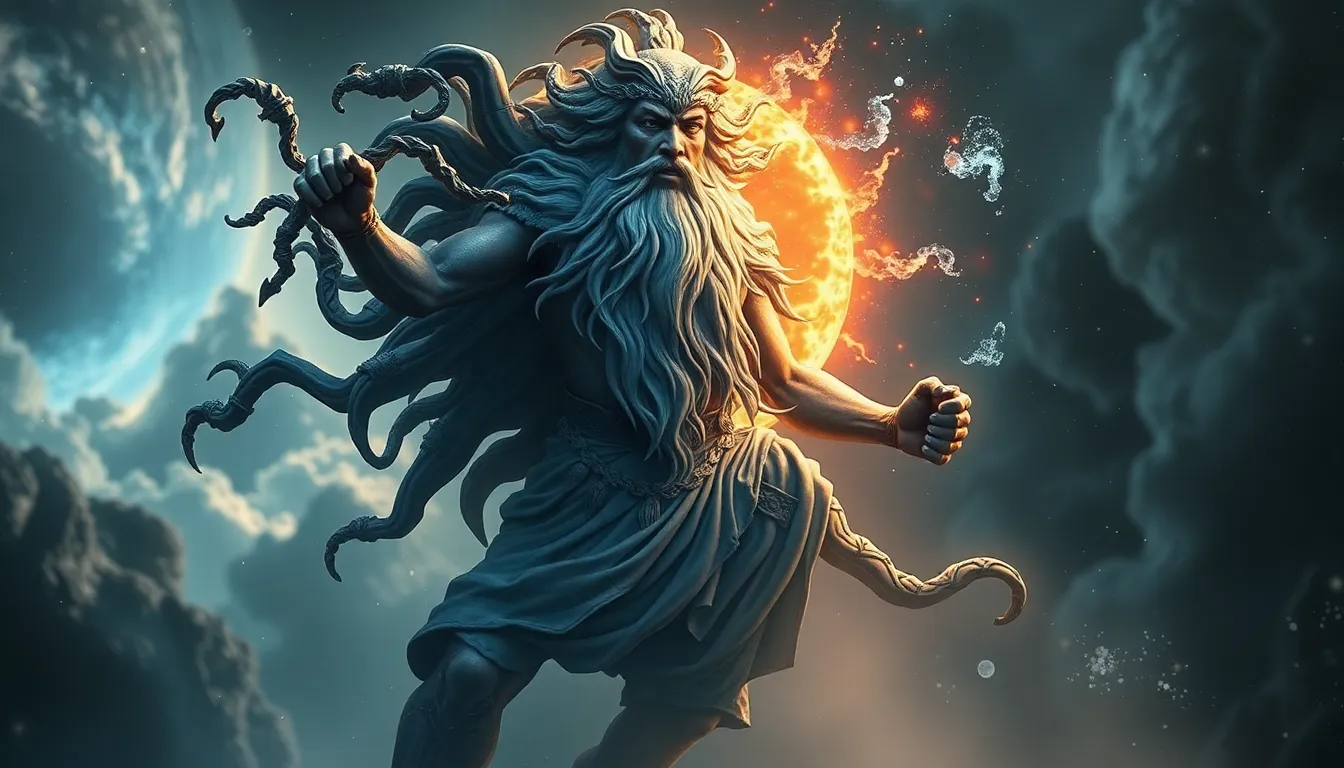Uranus and His Role in the Greek Creation Myth
I. Introduction
Greek mythology is a rich tapestry of stories, gods, and creatures that have fascinated people for centuries. Central to these myths are primordial deities, the first beings that emerged at the dawn of creation. Among these primordial figures, Uranus stands out as a significant entity representing the sky. His role in the Greek creation myth is pivotal, as he embodies the heavens and serves as the father of many notable figures in later myths.
II. The Origin of Uranus
Uranus was born from Chaos, the void that existed before the cosmos took shape. As the personification of the sky, he emerged fully formed, stretching over Gaia, the Earth, who was also born from Chaos. Their union symbolizes the relationship between earth and sky, a fundamental aspect of the ancient Greek worldview.
In Greek culture, the sky was seen as a vast, powerful force, representing the divine realm. Uranus, as the sky deity, was revered and feared, embodying the limitless and sometimes capricious nature of the heavens.
III. Uranus and the Titans
Uranus and Gaia gave birth to several offspring, the most notable being the Titans. These twelve powerful beings were central figures in Greek mythology, representing various aspects of the natural world and human experience. The Titans included:
- Cronus
- Rhea
- Oceanus
- Tethys
- Hyperion
- Theia
- Coeus
- Phoebe
- Iapetus
- Themis
- Mnemosyne
- Chronos
The Titans played a significant role in the formation of the world and were later involved in the Titanomachy, a great war against the Olympian gods. Uranus, as their father, represented the older generation of deities, and his influence was felt throughout the mythological landscape.
IV. The Conflict Between Uranus and Gaia
Despite their initial harmony, conflicts arose between Uranus and Gaia. Uranus became increasingly fearful of his children, the Titans, and as a result, he confined them to the depths of Gaia, causing her great distress. This dissatisfaction led Gaia to plot against her husband.
In her anger, Gaia gave birth to other monstrous offspring, including the Cyclopes and the Hecatoncheires (the hundred-handed ones). These beings were fearsome and powerful, further escalating the conflict within the family. The struggle between Uranus and Gaia symbolizes the tension between different elements of creation—chaos and order, earth and sky, nurturing and repression.
V. The Castration of Uranus
In a dramatic turn of events, Gaia devised a plan to overthrow Uranus. She fashioned a sickle and urged her youngest son, Cronus, to castrate his father. This act of rebellion is one of the most pivotal moments in Greek mythology, symbolizing the overthrow of the old order by the new.
As Cronus struck Uranus, he severed his father’s genitals, which fell into the sea, leading to the birth of Aphrodite from the resulting foam. This act not only marked the end of Uranus’s reign but also initiated a new era dominated by the Titans and eventually the Olympian gods.
The consequences of Uranus’s castration were profound, leading to a shift in power dynamics in the cosmos and the emergence of new deities.
VI. The Emergence of New Deities
Following the castration of Uranus, several significant events unfolded. One of the most notable was the birth of Aphrodite, who emerged from the sea foam as a symbol of love and beauty. This birth illustrated the idea that creation often springs from destruction.
Cronus, now free from his father’s tyranny, ascended to power and became the ruler of the Titans. However, the cyclical nature of power in Greek mythology suggests that this new generation of gods would eventually face their own challenges from the Olympians, led by Zeus.
VII. Uranus’s Legacy in Mythology
Uranus’s legacy in mythology is far-reaching. His influence can be seen in later myths and deities, as well as in the overarching themes of creation and destruction. He is often portrayed as a distant figure, representing the heavens and the primal forces of nature.
In literature and art, Uranus has been depicted in various ways, often symbolizing the vastness of the sky and the mysteries of the cosmos. His relationship with Gaia and the subsequent conflicts between their children reflect deep philosophical concepts about the nature of existence and the balance of power.
VIII. Conclusion
In summary, Uranus holds a significant place in the Greek creation myth as the primordial deity of the sky. His interactions with Gaia and their offspring set the stage for many of the conflicts and narratives that followed in Greek mythology. The themes of creation and destruction, authority and rebellion, resonate throughout the myths, illustrating the complex relationships between deities.
The enduring impact of Uranus in mythology and culture underscores the importance of primordial deities in understanding the universe and our place within it. As we explore these ancient stories, we uncover profound insights into the human experience and the natural world.




